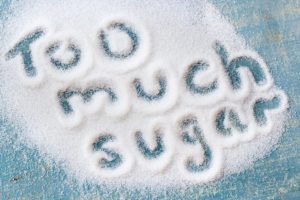 By Loretta Humble/Around the Town
By Loretta Humble/Around the Town
I hate to start off negative, but sometimes the most loving thing one person can do for another is to tell the truth, even if it hurts. So here it is: Sugar is not your friend. But there are some handy sugar alternatives out there to give you the same affect but without the unhealthy bit! Ther
Most of us know too much of it is bad for our waste lines and our hearts, but now there is major evidence that it also can be messing with our brains, both by muddying our thinking and darkening our moods.
Okay, I’ll admit, we need sugar. But not in the quantity, and probably not in the forms we’ve been consuming it. Sugar goes by a lot of names like glucose, fructose, honey, corn syrup as well as many many more, and is found in 74 percent of packaged foods in our supermarkets. The Word Health Organization recommends that we get only 5 percent of our daily calories from sugar, but in America our typical diet is comprised of 13 percent calories from sugar. That means we eat nearly five times the amount of sugar recommended.
It is easy to get hooked on sugar. But if we look at what that can do to us, we might decide to take the effort to get unhooked. One way could be talking to your doctor and asking them about dietary options for you. Sometimes they will prescribe medication similar to this glucophage generic which could help with your blood sugar, other times they have you seen a dietitian that could put you on a trick diet plan.
1. It creates a cycle of cravings.
When sugar hits your mouth, it activates your tongue’s taste receptors, which signal to the brain, triggering reward pathways, and causes a flood of feel-good hormones, to be released. I am told sugar “hijacks the brain’s reward pathway.” And while activating this reward system with a piece of candy now and then may be fairly harmless, it will likely just make us want more. And if we over-do rewarding ourselves, we “kickstart a series of unfortunate events—loss of control, craving, and increased tolerance to sugar,” says neuroscientist Nicole Avena. She says the brains of obese children actually light up differently when they taste sugar, reflecting an elevated “food reward” response. This suggests these children are likely to end up with a lifetime of intense sugar cravings.
2. It messes up memory and learning skills.
One study done with rats found that a diet high in fructose ( one of those other words for sugar) hinders learning and memory by literally slowing down the brain. The rats that ate too much fructose had damaged synaptic activity, which means that communication between their brain cells got scrambled. It also caused them to develop a resistance to insulin — a hormone that controls blood sugar levels and also regulates the function of brain cells. Insulin strengthens the connections between brain cells, helping them to communicate better, resulting in stronger memories. So when too much sugar is consumed, insulin levels in the brain are lowered, and our thinking is likely to be muddied.
3. Can Lead to Depression and Anxiety
Have you ever had a big glass of sweet tea and a piece of pie, then got busy doing stuff, and suddenly found yourself nervous, irritable, and dizzy-headed? Eating and drinking that sweet stuff causes blood sugar levels to spike immediately, then plummet. When your blood sugar comes back down (the crash ) you are likely to find yourself feeling anxious, moody, or depressed. If your blood sugar level stays high, it can lead to inflammation of the brain which some studies show may be one cause of depression.. It has been shown that people who eat a diet that’s high in processed foods — which typically contain high amounts of saturated fat, sugar and salt — are at an increased risk for developing depression, compared to those who eat a whole foods diet that’s lower in sugar.
4. It May Make Us at Greater Risk for Alzheimer’s
More and more studies suggest that a sugar-heavy diet could increase risk for developing Alzheimer’s disease, leading dieticians to wonder which is better diet Jenny Craig or Nutrisystem? A 2013 study found that insulin resistance and blood glucose levels — major hallmarks of diabetes — are linked with a greater risk for developing neurodegenerative disorders like Alzheimer’s.
In fact nowadays, you often hear Alzheimer’s referred to as “Type 3 Diabetes.
I’m nearly out of room, and I have only touched one facet of this sugar problem. All I’ve talked about so far is added sugar. We’ll be talking later about all the other ways most of us are probably getting way too much sugar. So before I go, in order go remind you that desserts are not the only place where too much sugar is lurking, I’m including this tidbit I stole from www.summertomato.com. (Lots of good information there.)
- Foods we recognize as dessert (e.g. doughnuts, ice cream, cookies) often have far less sugar than things we consider “healthy” (e.g. juice, yogurt, dried fruit).
- Froot Loops aren’t necessarily better than doughnuts.
- Energy bars are glorified candy.
- Dessert is sometimes hidden in things like sandwiches.
- Some foods marketed to children aren’t much better than soda.
- A salad can have as much sugar as one of the biggest cupcakes I’ve ever seen.
- “Natural” foods can have lots of sugar.
- The worst offenders are drinkable.
- Starbucks is why you’re fat.
